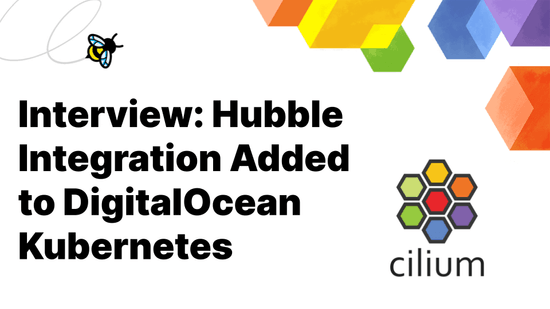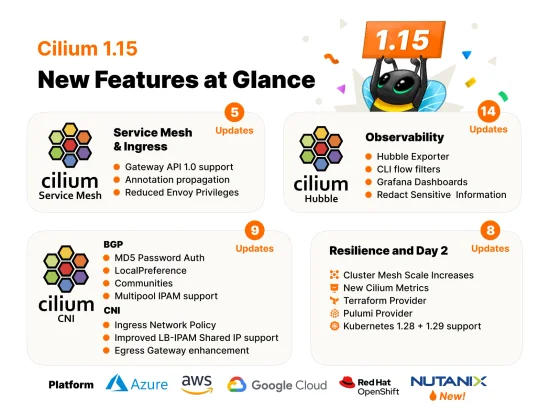Interview: Hubble Integration Added to DigitalOcean Kubernetes
Exclusive Interview with DigitalOcean on Integrating Hubble into their Kubernetes Offering
Exclusive Interview with DigitalOcean on Integrating Hubble into their Kubernetes Offering
Cilium 1.15 has arrived with Gateway API 1.0 Support, Cluster Mesh Scale Increase, Security Optimizations, and more
There is an amazing lineup of Cilium activities at KubeCon + CloudNativeCon
Dan Wendlandt, the CEO of Isovalent joins host Kevin Holditch for a discussion on the product they have created Cilium
Learn how to install Cilium in Kubernetes with KubeKey and visualize network traffic with Hubble
The Cilium core team are excited to announce the Cilium 1.10 release. A total of 2042 new commits have been contributed by a growing community of 280 developers. Contributions have come from a wide list of different companies including Alibaba, Datadog, Google, Isovalent, SuSE, Palantir among many others. We heard from users who are increasingly interested in better integration with the broader network, whether you're running Cilium in your own datacenter environments or in the cloud. Thus, a major focus of this release was ensuring a seamless integration between the Kubernetes network and enterprise on-prem infrastructure.
As more crucial workloads are being migrated to Kubernetes, network performance benchmarks are becoming an important selection criteria when deciding what network layer to leverage in a Kubernetes cluster. In this blog post, we'll explore the performance characteristics of Cilium based on extensive benchmarks that we have run in the past few weeks. Upon popular request, we are also including measurements for Calico to allow for a direct comparison.
We are pleased to introduce the availability of Cilium in the Red Hat Ecosystem Catalog as well as the certification of Cilium as a Certified OpenShift CNI Plug-in. The Container Network Interface (CNI) badge is a specialization within Red Hat OpenShift certification available to networking products that integrate with OpenShift using a CNI plug-in. Users running OpenShift can feel confident that running Cilium will not negatively impact their Red Hat support experience.
The organizers of the Networking and BPF track at the 2021 edition of the Linux Plumbers Conference (LPC) are pleased to announce the Call for Proposals (CFP). The conference is planned to be held virtually on the wider Internet, on September 20th - 24th, 2021.
We’ve just launched a new community resource:networkpolicy.io, to help people learn how to apply Kubernetes network policies to protect their business-critical workloads. But why do we need network policies at all? Let’s consider why traditional network security approaches aren’t sufficient in the cloud native world, and see what advantages we can gain through network policies.
Welcome to the Cilium User Survey 2021! We are looking to improve Cilium further and are interested in feedback and guidance from our users. Cilium has been a community-driven project from the beginning and the majority of our roadmap has and will continue to be defined by our users. Tell us what you want. Tell us what you are struggling with. Tell us what we can do better.
Implementing Network Policy is a critical part of building a secure Kubernetes-based platform, but the learning curve from simple examples to more complex real-world policies is steep. Not only can it be painful to get the YAML syntax and formatting just right, but more importantly, there are many subtleties in the behavior of the network policy specification (e.g. default allow/deny, namespacing, wildcarding, rules combination, etc.). Even an experienced Kubernetes YAML-wrangler can still easily tie their brain in knots working through an advanced network policy use case.
For live conversation and quick questions, join the Cilium Slack workspace. Don’t forget to say hi!
Join slack workspace










